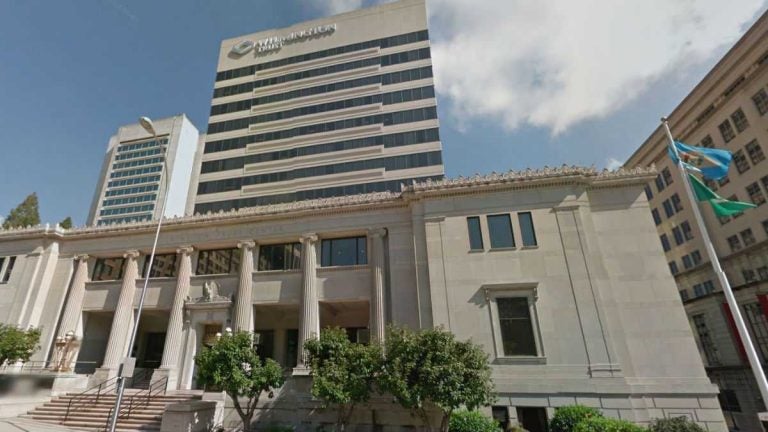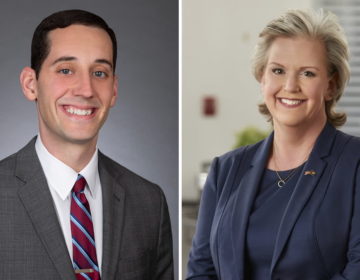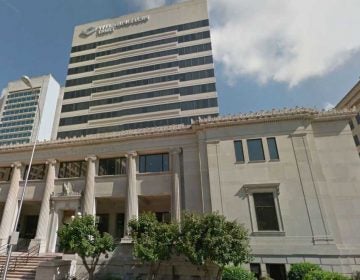Four former Wilmington Trust executives guilty of fraud
A 12-member jury has found four former Wilmington Trust executives guilty on all charges.
Listen 1:28
Six former officers of Wilmington Trust have been sentenced to prison for financial crimes. (image via Google Maps)
A 12-member federal jury Thursday found four former Wilmington Trust executives guilty of fraud and conspiracy charges.
Robert Harra, David Gibson, William North and Kevyn Rakowski were accused of hiding millions of dollars in bad loans on the bank’s books from the Federal Reserve, the Securities and Exchange Commission and the public between October 2009 and November 2010.
After six days of deliberations, jurors delivered guilty verdicts for all four defendants on all charges. A sentencing date hasn’t been set, but it will likely be in about four months.
Attorneys for at least one of the defendants have vowed they will appeal the conviction.
“We are stunned by the jury’s decision in this case,” said Harra’s defense team. “The simple fact is that our client is an honorable man who never in his life thought about committing a crime. We will vigorously appeal this.”
Wilmington Trust “was the gold standard for many years in the state of Delaware, and its demise was a significant development in this community, particularly to employees, shareholders and customers of the bank,” said Delaware U.S. Attorney David Weiss.
“The defendants’ actions contributed significantly to the bank’s demise — they loaned money recklessly to a small group of real estate developers, while other bankers were pulling back and taking a more conservative approach,” Weiss said.
A 18-count superseding indictment charged the defendants with lying in securities filings and to agencies of the federal government; conspiracy to defraud the U.S.; to commit fraud in connection with the purchase and sale of securities; making false statements to regulators; and a host of related charges.
Prosecutors said the defendants schemed to hide the true volume of past-due loans on a “second set of books” and were well aware the practice was illegal.
By the end of 2009, the bank reported only $10.9 million in bad loans, while waiving more than $360 million, prosecutors said. The bank also raised $287 million in investments without disclosing its financial problems to investors, they said.
Auditors, the Federal Reserve and other outside parties warned Wilmington Trust it had significant problems in its loan portfolio. The entities were so concerned, they downgraded the bank’s level of safety and soundness, requiring it to submit monthly reports of past-due loans.
‘Victims of their own arrogance’
When the defendants knew they could no longer hide the alleged scheme, prosecutors said, they created a “mass extension process” of temporarily extending loans on a short-term basis.
In less than two months, the bank allegedly extended about 800 loans worth more than $1.3 billion. Prosecutors said some borrowers didn’t know their loans had been extended.
“The defendants were victims of their own arrogance,” Weiss said.
“They convinced themselves they knew better. It was OK to waive and mass extend hundreds of millions of dollars of past-due loans because the market was going to bounce back, because they knew their customer base and these customers were good on these loans,” he said.
“However, the jury rightfully concluded these defendants had an absolute obligation to disclose the condition of its loan portfolio and amount of past-due loans to the Federal Reserve, the SEC and the public. It was not up to them.
“The public absolutely has the right to know how these financial institutions are keeping score,” he said. “Especially when, in February 2010, you’re going to go to market and seek to raise another $287 million from the public.”
Throughout the nearly two-month trial, defense attorneys argued the defendants did share past-due loan information with the Federal Reserve and auditors, pointing out the bank’s CEO was also on the Federal Reserve board.
They also contended it was a 28-year practice, and no one informed the defendants it was illegal.
Prosecutors and the defense teams also argued over the definition of a past-due loan and what is required to be reported.
Defense attorneys called Wilmington Trust a “relationship bank,” with a commitment to helping borrowers during the economic crisis — so long as they continued to pay interest — in an effort to prevent foreclosures or other financial hardships.
They also focused much of the blame on Joseph Terranova, who testified against the executives on behalf of the prosecution. In 2013, Terranova pleaded guilty to conspiracy to commit bank fraud, and is currently awaiting a sentence.
Several of the counts are attached to a maximum 30-year sentence.
In October, Wilmington Trust, which was acquired by M&T Bank in 2011, reached a $60 million settlement with the U.S. attorney’s office — including $16 million previously paid to the Securities and Exchange Commission in a related action.
Disclosure: Wilmington Trust supports WHYY.
WHYY is your source for fact-based, in-depth journalism and information. As a nonprofit organization, we rely on financial support from readers like you. Please give today.





